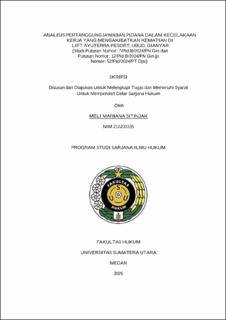Analisis Pertanggungjawaban Pidana dalam Kecelakaan Kerja yang Mengakibatkan Kematian di Lift Ayuterra Resort, Ubud, Gianyar (Studi Putusan Nomor: 7/Pid.B/2024 PN Gin dan Putusan Nomor: 12/Pid.B/2024/PN Gin jo Nomor: 52/Pid/2024/PT Dps)
Analysis of Criminal Liability in Work Accidents Resulting in Death in The Ayuterra Resort Elevator, Ubud, Gianyar (Study of Decision, Number: 7/Pid.B/2024/Pn Gin and Decision Number: 12/Pid.B/2024/Pn Gin Jo Number: 52/Pid/2024/Pt Dps)

Date
2025-07Author
Sitinjak, Meli Mariana
Advisor(s)
Yunara, Edi
Nurmalawaty
Metadata
Show full item recordAbstract
Workplace accidents are undesirable incidents that can result in physical or psychological injuries, and in severe cases, death. In Indonesia, construction sector accidents frequently occur due to weak project supervision and a lack of discipline in applying Occupational Safety and Health (OSH) standards. One prominent case is the fatal elevator accident at Ayuterra Resort, Gianyar, Bali, which was caused by negligence in construction oversight. This study examines the legal framework surrounding fatal workplace accidents, the criminal liability of involved parties, and the judges' considerations in imposing criminal sanctions based on Decision Number: 7/Pid.B/2024/PN Gin and 12/Pid.B/2024/PN Gin jo 52/Pid/2024/PT Dps. The research uses a normative legal method with a descriptive approach, relying on literature-based data and qualitative analysis. The legal regulation of fatal workplace accidents refers to provisions both within and outside the Indonesian Penal Code (KUHP). Criminal liability may be imposed when specific elements are met: the capacity to be held accountable, the presence of fault (either intent or negligence), and the absence of justification or excuse. In the aforementioned rulings, the defendants were proven guilty of criminal negligence resulting in death, committed jointly, with no valid justification or excuse. The judges' sentencing was based on both juridical and non-juridical considerations arising from the case examination. However, the sentencing differed among panels of judges, despite the same type of offense.
Collections
- Undergraduate Theses [3137]
